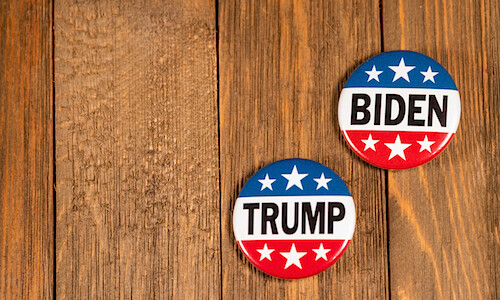In November, US voters will head to the ballot boxes and select their next President. This will be a very significant election and the outcome will have major implications for Asia, especially China. Private banks sound off on the economic and market outlook.
Donald Trump and Joe Biden are making their respective effort to win over voters in the upcoming US presidential election. In the latest, the two kicked off a series of debates to make their case – as well as make the case against the opposition. According to opinion polls, Trump currently has the lead, including in swing states.
The outcome of the election will have major implications beyond the US, particularly in Asia where US-China relations have been worsening over recent years.
Trump or Biden?
While no private bank has yet made the bold move of forecasting a winner, the consensus is that a Trump administration will prove to be riskier for Asia.
«If we get a Biden victory, especially if it is with a divided Congress, then the impact on Asia is more or less status quo,» said UBS Global Wealth Management APAC chief investment officer Min Lan Tan. «But if we get a Trump victory, then the level of uncertainty is going to rise much more».
Trade War Impact
One of the major concerns of a Trump victory is the potential intensification of a US-China trade war. The ex-president previously suggested imposing a 60 percent tariff on Chinese goods and 10 percent on Asia overall.
In terms of economic impact, Pictet estimates that China could see a 0.2-0.4 percent reduction in GDP for every 10 percent in tariffs imposed. UBS said Asia as a whole could see a 1 percent reduction.
Market Call
Private banks are divided on the market outlook. Deutsche Bank Private Bank is constructive on China, highlighting tailwinds such as the economic shift away from exports to consumption. In contrast, Stefan Hofer, chief investment strategist at LGT Private Banking Asia, is cautious on China and recommends investors to «wait for calmer geopolitical waters ahead».
Some believe that trade frictions with China could also become tailwinds for other markets. UBS, for example, said that Malaysia and Thailand could be beneficiaries as suppliers of medical gloves due to a US government announcement to increase tariffs on such products from 7.5 percent to 25 percent in 2026.
Post-WWII Order
But regardless of who will win the election, geopolitical tensions are expected to remain elevated, not only between the US and China but globally, including the Middle Eastern and Russia-Ukraine conflicts.
«It’s important to have this top-down view […] that all this is pretty much the symptom or the result of continued weakening of the post-WWII global order,» said Dong Chen, chief Asia strategist and head of Asia research at Pictet Wealth Management. «Unfortunately, I think this trend will likely continue.»














